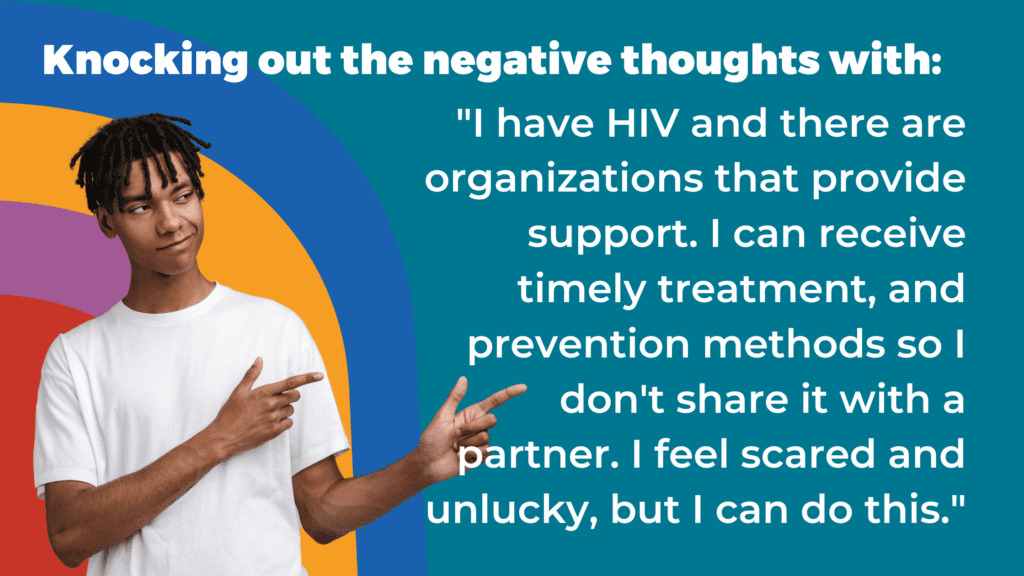So, you’ve decided to get tested for HIV. You made it this far, but you’re nervous. Scared is an understatement. Maybe you’re angry. Before you even have any results, you find yourself having intense, negative thoughts like, “Why is it always me? I’ve never had anything go my way.”
Accessing HIV testing and navigating a positive result can be difficult due to the stigma associated with HIV. Fear, anxiety, and shame can prevent people from getting tested or seeking support if they receive a positive result. Fortunately, there are many organizations dedicated to helping individuals facing these challenges counseling services, support groups, and information about safer sex practices. People living with HIV can also find resources for discussing their HIV status with family, friends, and partners to foster understanding and connection. With the right support network in place, people living with HIV can live happy and healthy lives while navigating the unique challenges they face.
To combat negative thinking, there are multiple types of therapies that can be beneficial for someone. Cognitive Behavioral Therapy (CBT) and Dialectical Behavioral Therapy (DBT) are two common psychotherapies that help people learn adaptive skills to manage difficult emotions, improve relationships, and engage in healthier behaviors. Other therapies such as Eye Movement Desensitization Reprocessing (EMDR) can help reduce distress from past traumas, while art or music therapy can provide a creative outlet for personal expression. Holistic practices like yoga, meditation, mindfulness-based stress reduction, and breathing exercises can also be of great benefit.
It’s your lucky day because we’re going to dive into some tips and techniques from a therapist to help you navigate negative thinking, conquer HIV testing, find support and even help with day-to-day life.
Types of Negative Thoughts
In cognitive behavioral therapy, these ideas are called cognitive distortions. This comes from the idea that certain thoughts are distorted and manipulated by our emotions. These distortions take the form of negative or unhelpful thoughts that don’t always consider the facts about a situation. When we get troubling news, these distorted thoughts start to flow. It can be our own experiences or even responses from others that perpetuate these thoughts.
1. Black or White Thinking
Distorted thoughts hold the idea that only one thing or another can be true. We can observe this distortion in people who hold beliefs like “If you are living with HIV, you must be a bad person.” This is the thought of a person who does not see shades of gray.
2. Over-generalization
When we overgeneralize, we make sweeping statements based on partial evidence. Over-generalization is when we say, “Why is it always me?” or “I’ll always be alone.” It can be easy to make these statements following one or a series of upsetting events.
3. Mental Filter
Mental filter, like the other unhelpful thoughts, involves only paying attention to certain types of information. Maybe we are upset about the news we have received or have had a difficult couple of months. In these times, we may get so used to only seeing the negative or difficult aspects of a situation. We filter out any information that doesn’t fit our current experiences or emotional state. Additionally, we may disqualify positive information if we are feeling sad, anxious, angry, or depressed. We may find ourselves thinking “That doesn’t count” or “You only say that because you’re my oldest friend.”
4. Jumping to Conclusions
When we assume we know what the future holds, the result can be very upsetting. We may assume we have failed or that we have no other options. This can present itself in statements like, “Because I have HIV, I’m going to have a miserable life.” Also, in jumping to conclusions, we may act like we can read minds. In this situation, we are making decisions based on what we assume other people are thinking. For example, we may decide not to disclose information about ourselves to someone based on how we assume they will react. When we do this, we limit our support systems and cause ourselves more stress.
5. Should/Must Thinking
With these thoughts, we apply rules and beliefs to other people and situations that don’t necessarily follow the same code that we do. For example, “She should know better than to talk to me like that.” In this instance, we are assuming what another person knows and that they place the same weight on the knowledge that we do. Additionally, this distortion can affect our images of ourselves. By saying “I should’ve known better” or “There must be something wrong with me,” we punish ourselves for not knowing the rules or not being able to see the future. This may tie into other unhelpful thoughts like mental filter, black or white thinking, and generalizing.
6. Labelling
Here, we assign a name or title to a person or situation. Often, these labels are restrictive and limit the potential for change. For example, if we label ourselves as “irresponsible” or “broken,” where does that leave us? Additionally, when we label ourselves as “strong” or “successful”, we can cause ourselves to have negative reactions when the opposite feels true. This can fit in with negative thoughts like should/must thinking, generalizing, and black or white thinking.
7. Personalization
This distortion is all about blame. As people, we want to find the source or the cause of something that is upsetting to us. We may shift the blame onto another person by saying, “I wouldn’t be experiencing this if they had told me first.” Additionally, we may take blame for things that aren’t necessarily our fault, saying “If I could have done something, things would be different now.”
8. Fallacy of Control
This unhelpful thought is the false belief that we are either a) in complete control of our lives and everything that happens in them or b) we have absolutely no control and therefore we are responsible for nothing. There is nothing wrong with wanting to control our situations, but expecting and wanting that control to be constant, sets us up for disappointment in the end. With the opposite, feeling as though we have absolutely no control leaves us feeling like helpless victims. These unhelpful thoughts are statements like “I was so careful, I shouldn’t have HIV.” This thinking does not leave room for the things in life that are unexpected or surprising.
9. Fallacy of Fairness
In an ideal situation, everything would be fair. But, as we all know, that is not always the situation. If we fall into this fallacy that everything is always fair, we are likely to become angry, resentful, or depressed when we eventually experience and unfairness.
Navigate and Control the Thoughts
There are several ways we can work through or overcome unhelpful thought processes. In most cases, you may have noticed that many patterns are rooted in emotional responses to experiences. Controlling emotional responses is not an inherently easy task. Here are some tools you can use and resources you can explore to help navigate these thoughts.
Challenge the Thoughts with Facts
It can be helpful to filter out what is an emotion and what is a fact. For example, let’s look at the statement “I have HIV, and I have no options.” In this statement, the fact is, “I have HIV.” The second part of the statement, “I have no options”, is rooted in several distorted, emotional thoughts. This could be a generalization of past experiences where options were denied because of HIV status, which leads to the false conclusion that there are no options.
 We know our feelings are valid, and we are allowed to feel frustrated or scared when we receive news that is challenging. We should allow ourselves to have these feelings. But when we allow those feelings to take control, a situation becomes even harder to navigate. By focusing on the facts, we can make logical choices about our actions instead of acting out of emotions like fear or anger.
We know our feelings are valid, and we are allowed to feel frustrated or scared when we receive news that is challenging. We should allow ourselves to have these feelings. But when we allow those feelings to take control, a situation becomes even harder to navigate. By focusing on the facts, we can make logical choices about our actions instead of acting out of emotions like fear or anger.
Check the Origin of the Thoughts
We can further control these thoughts by figuring out where they the patterns from which they originated. When we notice we are thinking in a distorted way, we can keep track of when the thought started, which emotions followed the thought, and which behaviors impacted or were affected by the thought. Doing this allows us to understand our behaviors better and to be proactive in taking control of our thoughts. Feeling more prepared will help us feel less overwhelmed when such thoughts arise.
Seek Support From a Counselor
It can be scary and overwhelming to tackle these thought patterns alone. By reaching out to a therapist or counselor, we gain helpful support and advice. Especially if the counselor is trained specifically in cognitive behavioral therapy, they can assist you in challenging unhelpful thoughts and exploring their roots. There is a list of local resources below.
Final Thoughts
Remember that negative thinking, fear, and shame should not prevent anyone from accessing the services they need to live a successful life. Breaking through stigma and creating supportive communities is the key to giving yourself the resources and support you need for a successful life. By understanding our experiences, addressing fears and doubts, embracing compassion for oneself, we can begin reducing stigma around HIV.
Continue to remind yourself that your negative thoughts don’t define or control you. By managing thoughts and staying connected to support, you will be able to navigate situations and replace thoughts like, “Why am I so unlucky?” with,”That’s not true, I’m in control”.




